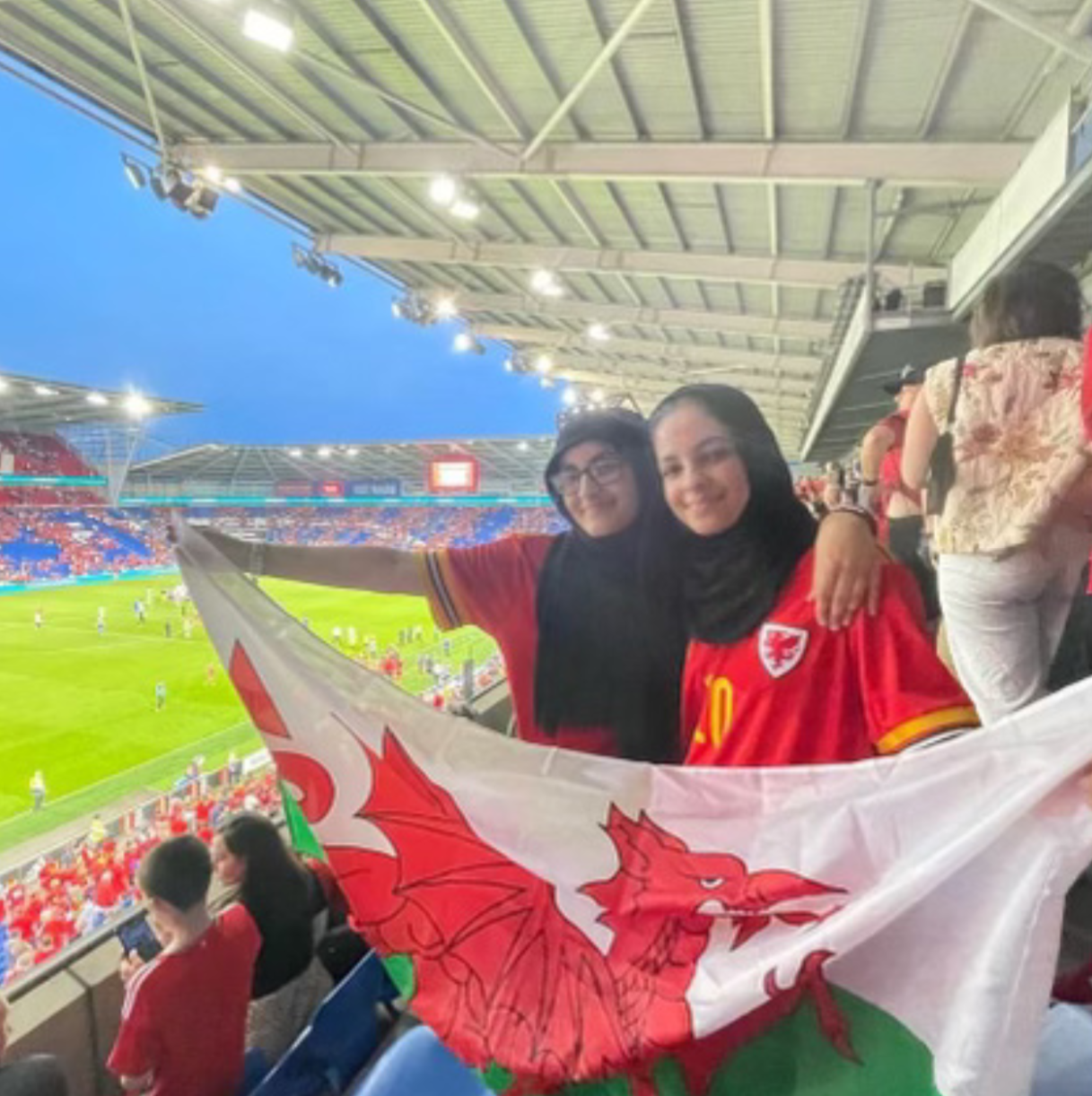
The seasons have changed, and it is raining heavily outside. The coffee shop is quiet. In the far corner, I read over my notes, warming up with a coffee. Alone. Then, suddenly, there is a shift.
Reader, the first thing you will notice about Eleeza and Rosheen Khan is their radiating kindness. A sudden embrace, compliments and smiles. I automatically forgot the sombre setting outside, and I am completely uplifted, calm and relaxed. They light up the room. They make you feel at home. They find a common connection, and it’s that common connection, and it’s that compassion, I think, which is remarkably special.
At the ages of 17 and 19, Eleeza and Rosheen became Wales’ first muslim female football referees. Since working towards their ‘C-Certificate’, designed to educate candidates in the technical, tactical, physical, psychological and social requirements of modern football, the two sisters have been committed to breaking stereotypes, defying age limits and encouraging all people to pursue their passions.
I am curious to know how it all began. Rosheen recounts her earliest memories of watching the game. She tells me that football was a “culture instilled when we were kids”. Eleeza says that it was their Dad who inspired them to watch the game, but what captivated her was the fact that “football is the game where you can get a ball and throw it on the pitch in any country and, without saying anything, people automatically know what it is.” It’s that universal connection, the ability to unite with all.
The sisters, both from Grangetown and schooled in Penarth, began working together with the Football Association of Wales (FAW).
“Sometimes last year, we were in our youth group. We kept seeing this man pacing back and forth in the building and wondered what he was doing. One of our youth workers, Ali, came up to us and said: Girls do you want to be referees.”
From there, Eleeza and Rosheen first completed a six-hour online course in 2022 with the Football Association of Wales and later in 2023, worked towards their ‘C-Certificate’.
Eleeza said: “I think we were lucky, balancing it with school and other stuff, because usually it takes three to four month to do, but FAW were kind enough to speed up the process. It was a bit more intense; we met up regularly, and it was all completed in six weeks. There were about ten of us, all from different areas of the community. All of us were girls, but me and Rosheen were the only ones that went through with it.”
Lowri Roberts, Head of Women’s Football at FAW, and Jack Rea, Referee Recruitment and Retention officer at FAW, “were two people who played a massive role in helping us”, say the sisters.
Despite radiating positivity, both Eleeza and Rosheen are candid in sharing their struggles. Eleeza talks about how “imposter syndrome and positive discrimination are the two big ones for us”. She adds, “It’s feeling as though you shouldn’t be there” and that “imposter syndrome is an internal barrier and a lot of our struggles are internal.”
I touch on how they try to navigate these barriers and what they do to overcome them.
Rosheen said: “I do what I do because I want to inspire so many other girls to get into the game because so many people inspired me. We want to inspire the next generation and to get as many girls, and girls that look like me, into the game.”
I ask about their views on the representation of women and girls, as well as ethnicity, in football.
“I’ve got a lot better since the World Cup. Last year, when we became referees, we were shocked knowing we were the first muslim female referees in Wales.”
Eleeza shares that “the man who delivered our workshop is an ethnic minority referee himself and was championing representation in football before us, but there was no women representation.”
They both agree on one point: “there is still much more to do.”
The sisters open up about recent encounters with discriminatory comments, both because of their gender and religion. I ask what they would say to those who don’t understand. Rosheen says: “We are always going to be here and we are going to do what we do no matter what anybody says.”
Eleeza adds: “It’s okay to have those difficult conversations with us; we’re not here to try and catch you out. It’s okay to ask those difficult questions and it means a lot of us. It’s probably very hard on the other side asking those questions, but do ask those questions.”
As two pioneers, I wondered what advice they would give to those who wish to fulfil their ambitions. We all face difficulties and challenges, and we all have times when we struggle, but the sisters both agree that “every opportunity and every risk is a learning curve.”
“Mine would be, just go for it. Because if I never went for it, we wouldn’t have been the first [female muslim referees] in Wales and we would not have been able to break down those barriers.”
Agreeing, Eleeza adds: “A phrase I heard from someone was that, the other side of failure is growth, and that is something that I keep in my mind a lot.”
A three minute introduction became a three hour conversation. The sisters tell me of their busy day ahead; birthday celebrations, homework, a fundraiser at their Youth Forum at the Grangetown Pavilion and, of course, a little time to watch the football.
We ended as we began, an embrace, compliments and smiles. Walking back out into the rain, something the sisters had said stuck in my mind. “We feel that we need to do it, do it for every other girl.”





